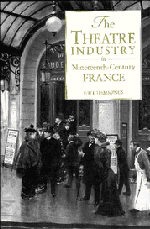17 - From acceptance to performance
Published online by Cambridge University Press: 07 December 2009
Summary
The decision whether or not to accept a play submitted by the author was generally considered a task best left to theatre managers; they, after all, were responsible to their backers for the financial prosperity of the enterprise, a prosperity which depended to a large extent on a good supply of suitable dramatic material. The legal position was that the manager was deemed ‘the supreme arbiter of the admission or rejection of plays, as incarnating in his own person all the rights attached to the administration he heads’. This did not, of course, preclude his seeking advice elsewhere. During the Restoration period in particular, several of the more important theatres, the Vaudeville, the Gymnase, the Variétés, the Porte-Saint-Martin, and some of the more ephemeral ones, the Panorama-Dramatique and the Théâtre des Nouveautés, had regular reading committees composed of veteran dramatists or men of letters, some of whom served on more than one: Francois Raynouard, Charles Nodier, Viennet, and Pigault-Lebrun, among others. Later in the century, such committees lost even the status they had enjoyed previously and, where they existed, served the director merely as a buckler against the importunate protests of disgruntled dramatists. It was generally supposed that he only summoned his committee when he wanted to reject a manuscript; this might consist of ‘a biddable and harmless shareholder together with the secretary of the theatre’, both of whom knew the drill perfectly well. The chairman would vote for acceptance, they would both pretend to disagree and vote for rejection, whereupon he could then tell the author that although he personally would have liked to put the play on, the rest of the committee had unfortunately overruled him.
- Type
- Chapter
- Information
- The Theatre Industry in Nineteenth-Century France , pp. 257 - 274Publisher: Cambridge University PressPrint publication year: 1993



